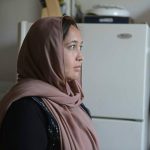Zainab Amiri arrived in Pittsburgh in September, pregnant and alone.
She had no choice, she said, but to leave her native Afghanistan behind.
“I was not able to stay in my home (in Afghanistan), and I had to leave everything,” she said via an interpreter as she looked down at her infant son. “A woman needs so much support during pregnancy. I came here for a better future for my baby.”
It’s been one year since the Afghan government collapsed on Aug. 15, 2021, after the Taliban took control of the capital city of Kabul.
Amiri, 29, of Shadyside is one of the nearly 800 Afghan refugees who arrived in Western Pennsylvania between August and February, according to the Jewish Family and Community Services Pittsburgh based in Squirrel Hill, one of the organizations assisting refugees. Those estimated 800 were among the more than 80,000 refugees who fled Afghanistan in the wake of the United States’ decision to withdraw military forces from the country, according to the Department of Homeland Security.
After the fall of Kabul, Afghan men, women and children crowded onto U.S. military evacuation flights and were transported to military bases.
Resettlement organizations such as Jewish Family and Community Services; Acculturation for Justice, Access, and Peace Outreach; Hello Neighbor; Bethany Christian; and Ansar have been helping refugees who arrived here via a temporary protection status called humanitarian parole.
The groups assist by securing housing, employment, school enrollment and health care appointments. They help with public transportation orientations. They aid in establishing bank accounts.
Related:
• Despite hurdles, these Afghan refugees successfully made transition to living in Pittsburgh area
• Pitt law school to help Afghan asylum seekers receive pro bono legal representation
“If you can, imagine what you might need going to a new country where you don’t know anyone, don’t have any connections and don’t speak the language or know the local culture,” said Sloane Davidson, founder and CEO of Larimer-based Hello Neighbor. “That’s where we step in.”
The agencies do what they can to assist, but that can be complicated, especially when there are so many refugees. The government gives each of them — including children — $1,225, according to Ivonne Smith-Tapia, director of JFCS Refugee & Immigrant Services. For example, a family of five would receive $6,125.
Smith-Tapia said there are 785 Afghans who have arrived in Pittsburgh in the past year.
Federal funding pays for rent for a limited number of months, sometimes three, maybe more, depending on the rent. There also are private funds from individual donors and family foundations available.
“That enables us to provide ongoing support for a couple more months while families stabilize and adjust to life in the U.S.,” Smith-Tapia said. “This is in addition to in-kind donations and gift cards provided by community members that help us obtain groceries and household items for families when they first arrive.”
Those additional funds are available for housing and food, especially for those who have extensive needs, said Dana Gold, chief operating officer for JFCS, based in Squirrel Hill.
Ansar of Pittsburgh, which is based in Carnegie but has an office in the Islamic Center of Pittsburgh, also helps with refugee resettlement. Wiam Younes, Ansar founder and executive director, said the group has assisted Afghan refugees with everything from housing to food over the past year.
She said religious organizations such as the Islamic Center help refugees because they understand their culture and beliefs.
“From the feedback we have gotten, the Afghan refugees said the Islamic Center has been welcoming and makes them feel good,” Younes said. “When they come to a new country, they have some anxiety.”
‘I need support’
Amiri knows she needs to find work, but she speaks scant English and has an infant and little support system.
She worries about her husband, a special forces commander with the former Afghan army who is hiding in Afghanistan. Amiri was a first lieutenant.
She knows she soon will have to make rent payments on her own. Hello Neighbor is helping to pay for her one-bedroom apartment. She said she needs help with most things, including how to find work and understand doctors during check-ups.
“The biggest challenge was loneliness,” she said. “Being without family is hard.”
Amiri comes from a big family and is accustomed to dining with many people. For company, she finds YouTube videos of people dining and watches while she eats. She became emotional when talking about having her son at UPMC Magee-Womens Hospital in Oakland without any family members.
She was thankful for having an interpreter with her when she delivered.
“She helped me a lot,” Amiri said. “I really like her.”
Amiri has asked Hello Neighbor for help for her husband, but those requests are handled by the federal government, Davidson said. She said the agency’s focus is on supporting the people in Pittsburgh.
“It was not safe for me to stay in Afghanistan, and I want a better future for my son,” Amiri said. “I love my husband and miss him, and I am worried he can’t make it here. It was not an easy decision to leave and come to a new country. My future is uncertain, but I feel safer here.”
When Amiri arrived in Pittsburgh, she lived in one of three hotels accepted by the government, Davidson said. Amiri said she was so lonely that she would look out the window just to see people walking by. She said most refugees had little time to pack and arrived with only a backpack and a few personal items.
“I was someone back home, but not here,” Amiri said, “because I can’t speak the language and I need support.”
Barriers and challenges
The difficulty Afghan refugees experience acclimating cannot be overstated, Gold said.
The language barrier. The cultural differences. The loneliness.
Everyday tasks such as shopping for groceries, writing a check or catching a bus are suddenly monumental undertakings.
“Think about if you came to a new country,” Gold said. “You are overloaded with what is happening, and your brain can be overloaded with stimuli, so it can be traumatic and difficult to learn something new.
“The goal is for them to become independent. We do what we can to help them get on their feet, but we also have to set a reasonable deadline for them to be on their own.”
One of the first orders of business is to connect refugees with a resource such as tutors from Literacy Pittsburgh. It can be difficult for those with no English skills to take the initial step. They often look for interpreters to translate.
“Think about looking at a language that looks like a bunch of squiggles on a page and try to learn that,” Gold said. “It can be stressful.”
‘I don’t want to be dependent’
An Afghanistan flag, with vertical black, green and red stripes and a verse from the Quran, the Muslim holy book, hangs on a wall in Noorullah Amiri’s apartment in Shadyside.
A member of the special forces in Afghanistan, Amiri — no relation to Zainab Amiri — said he arrived here last year with his wife and children.
“I think if I did not come to the United States, they would kill me and my family,” Noorullah Amiri, 31, said through an interpreter. “I am safe here but worry about my family there.”
With a lack of English-speaking skills, he said he is “facing a problem.” It’s difficult for him even to write a check to pay his rent because of the language barrier.
Learning a new language, he said, will take time.
“I cannot learn overnight to speak English,” he said.
His daughter and son watch American cartoons on YouTube to help acclimate to their new home.
Amiri works a job at a cleaning company that he has to take two buses to reach each day — a four-hour ordeal in all. He said he is trying to save for a car but hasn’t purchased one yet because he had been sending money to help his family in Afghanistan.
He said he came for a better life.
“I don’t want my kids to have a miserable life in Afghanistan,” Amiri said. “The people here are kind. I have always wanted to live in a city like this. But I need to learn some things to be able to stand on my own two feet.
“I don’t want to be dependent.”
‘Nothing happens overnight’
Speaking fluent English has helped Azizullah Jan, 45, of Crafton Heights adjust to life in the U.S. better than most refugees.
He and his family arrived in August. Their first stop was Wisconsin, where they spent a few months before settling in Pittsburgh in February. He is here with his wife, a daughter and two sons. He has one son still in Afghanistan, one in Nebraska and one in Iowa.
Jan said the main concern for all Afghans is that they get to stay in the United States permanently.
Jan was an interpreter for the U.S. Army in Afghanistan. He recently started a job at a vitamin company. He said his boss allows him and his co-workers time for Muslim prayers at lunchtime.
“It was hard at first because it was such a long flight to get here,” he said. “We like it here. We can enjoy religious freedom here.”
Jan recalled the day he left Afghanistan — Aug. 24, 2021.
“It was so crowded, and some people waited for hours to get in (the airport),” he said. “Outside the airport, people from all walks of life were attempting to enter the airport and leave Afghanistan. Everyone was in a panic.”
He said he knows there are challenges for those who don’t speak English, but the agencies help with access to in-person learning. He said there are resources such as virtual classes and an English-to-Pashto (one of two main languages of Afghanistan) translation on YouTube.
“Nothing happens overnight,” he said. “What is that saying? … ‘You can lead a horse to water, but you can’t make him drink.’
“We are happy. It is peaceful here.”
• • •
Refugee resources
Acculturation for Justice, Access, and Peace Outreach
1835 Centre Ave., Hill District
Details: 412-391-4985 or ajapopittsburgh.org
Ansar of Pittsburgh
161 Cherrydell Drive, Carnegie
Details: 724- 624-3955 or ansarpitt.org
Bethany Christian Services
10521 Perry Hwy #200, Wexford
Details: 724- 940-2900 or bethany.org
Hello Neighbor
6587 Hamilton Ave., #1E, Larimer
Details: 412-567-3946 or https://www.helloneighbor.io/
Jewish Family and Community Services Pittsburgh
5743 Bartlett St., Squirrel Hill
Details: 412-422-7200 or jfcspgh.org
Literacy Pittsburgh
Chamber of Commerce Building, 411 Seventh Ave., Suite 525, Downtown Pittsburgh
Details: 412 393-7600 or literacypittsburgh.org
Afghanistan Project
Hasina Jalal, research associate, Center for Governance and Markets, Graduate School of Public and International Affairs at Pitt
Details: HAJ71@pitt.edu
Immigration Law Clinic
University of Pittsburgh School of Law
Sheila Vélez Martínez, professor and Jack and Lovell Olender Professor of Asylum Refugee and Immigration Law and Director of Clinical Programs and the Immigration Law Clinic at Pitt.
Details: siv7@pitt.edu
• • •
Free literacy program
Literacy Pittsburgh is helping to connect refugees with English classes and tutors.
Founded in 1982 as an all-volunteer organization, Literacy Pittsburgh on Seventh Avenue, Downtown, claims to be the largest such organization in the region. It boasts serving about 5,000 individuals each year.
“The definition of literacy is learning to interact and interpret the world around you,” said Carey Harris, CEO of Literacy Pittsburgh. “Things like learning how to take a bus or go to the post office and doctor’s appointments, and grocery shopping and how to use American money. I call it ‘cracking the code.’”
Literacy Pittsburgh can offer one-on-one tutoring, if necessary, although more tutors are needed. The number of refugees the organization is working with has increased dramatically, Harris said.
“Our resources have been stretched, and we have a waiting list, but we will do everything we can to help,” Harris said.



















